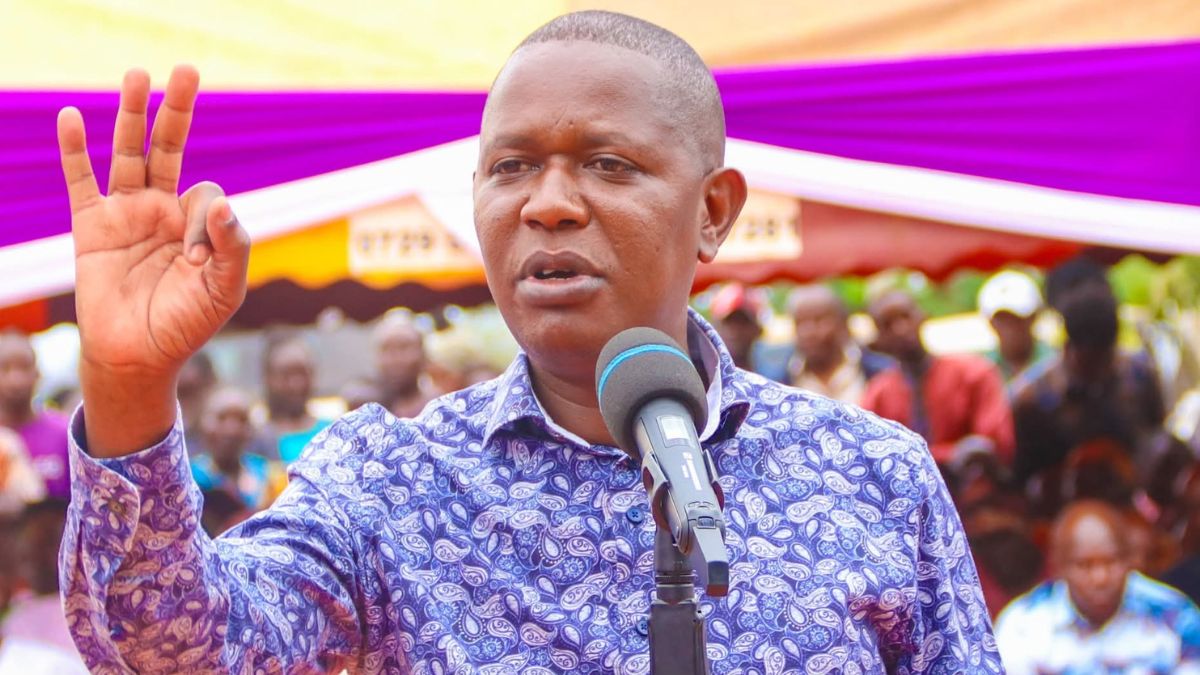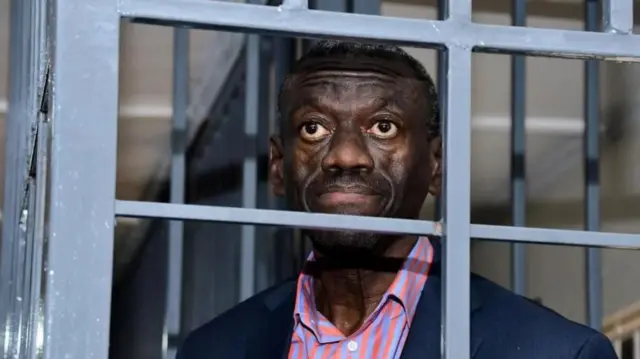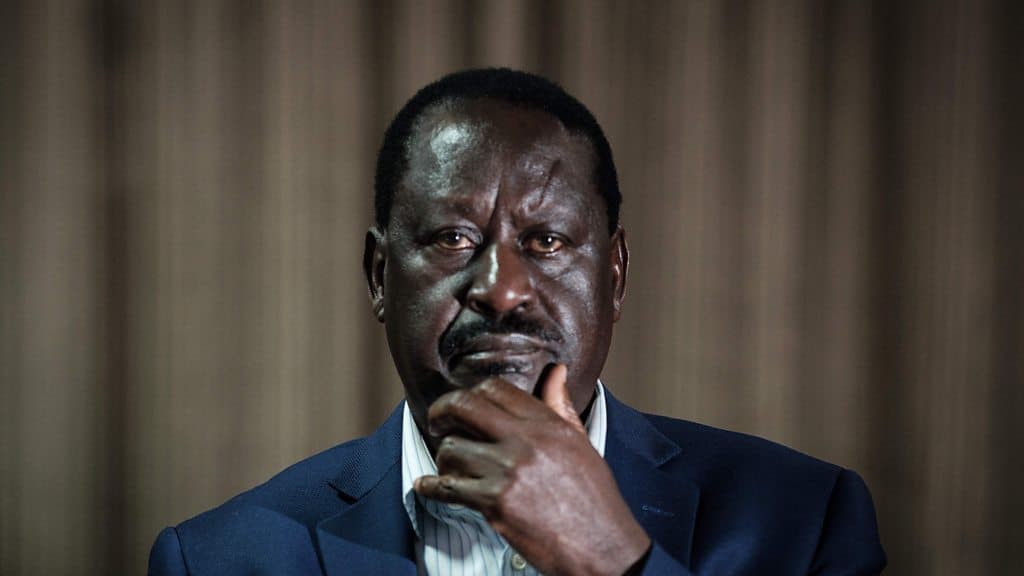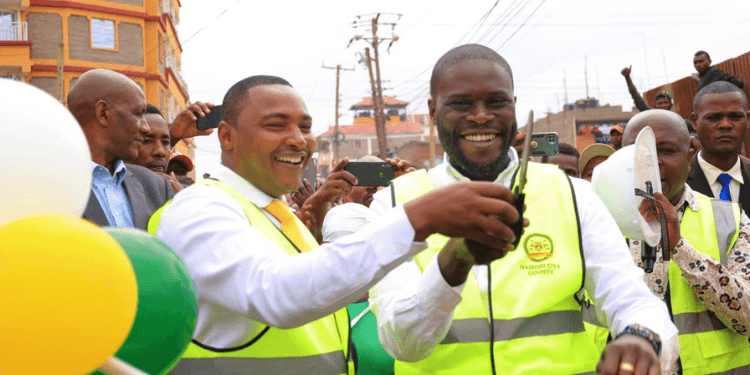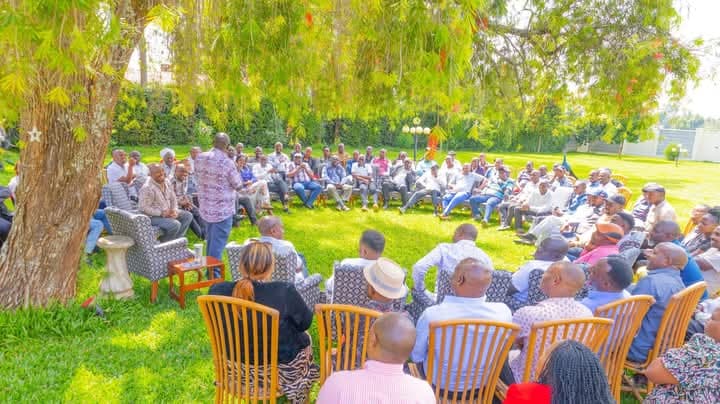Kibwezi West Member of Parliament (Mp) Mwengi Mutuse has backed President William Ruto’s 2027 re-election bid, telling off the Kenya-Kwanza administration’s critics.
Speaking on Saturday, June 28, in Kitui West during an empowerment forum presided over by Deputy President Kithure Kindiki, Mutuse slammed the opposition for orchestrating a "one-term" campaing against the head of state.
Mutuse defended the government, insisting the kamba community has benefited under the current regime, unlike previously when the community was left out in the cold.
The Legislator, criticised former Deputy President Rigathi Gachagua for his continued onslaught against President Ruto saying, Gachagua never initiated any project in the region during his tenure as the second in command.
"Ruto must win in 2027 by all means, Gachagua hakuna kitu alitusaidia Ukambani" said Mp Mutuse.
His remarks come days after President William Ruto’s Economic Advisor, Moses Kuria, drew parallels between the upcoming 2027 General Election and the landmark 2002 vote, claiming it will be shaped by a national consensus on the presidency rather than a fiercely contested race.
Speaking during an interview this week, Kuria said leaders eyeing the presidency will reach an agreement on a single candidate before the election, similar to how the late former President Mwai Kibaki’s 2002 candidacy was endorsed by a broad coalition.
“Let me shock you. Some people are training for a football match that will not happen,” Kuria said.
He argued that the 2027 election will not be business as usual and that the country will witness a new political path grounded in dialogue.
“2027 will be like 2002. There will be no presidential election. There will be a consensus,” he said.
Kenya's President William Ruto appears to be a man under pressure as he downplays concerns over unpopular policies and broken campaign promises.
The President recently said that concerns of a second term in 2027, would not stop him from making the tough decisions he believes are necessary to fix the economy.
Ruto said that his primary focus is not securing re-election in the 2027 general election, but on transforming the country and addressing Kenya’s economic challenges.
The head of state noted that the government is making long-term policies aimed at fixing the economy and overall development of the country.
“My work is not to plan how to be re-elected in 2027, my mission is to transform Kenya. We cannot continue to focus on the next election, we must begin to focus on the next generation,” Ruto stated
The President underscored that the government will continue making decisions that prioritize the interests of the Kenyan people, even if such decisions are perceived as unpopular.
“We cannot afford to be reckless and populists. We must be clear on what options we have and what decisions we must make. I am not ready to be cheered for pulling unsustainable moves that will hurt the people,” he asserted.
President Ruto ascended to power on a platform of change, pledging to centre the populace who, for decades, have been marginalised by successive regimes.
Ruto's campaign bait - a “bottom-up” economic agenda, promising to cut taxes, give small businesses interest-free loans - cut the country’s debt appetite by downsizing the government.
Over Two years into his 5-year first term, Majority of Kenyans, according to recent opinion polls, believe that his policies have worsened suffering.
Once in power, he has reneged on the popular promises under his manifesto and retained the exclusionary, oppressive, and divisive state that has virtually retained all the colonial attributes.
Ruto's most definitive moment, when he accrued intense resentment, was the Finance Bill 2024. The Bill was meant to anchor the government revenue collection and reduce external borrowing that has sank Kenya into massive debt.
However, through social media and other channels, Kenyans of all walks of life expressed outrage at the punitive taxes proposed under the Bill yet there is no accountability for endemic corruption, and wastage by the government.
Despite spirited opposition, the Bill went through the first and second reading and was eventually passed while protests were raging outside parliament. So enraged were the protesters that they stormed the parliament buildings and forced the MPs to scamper for safety.
Upon realising that he was fast losing the political initiative, President Ruto declined to assent to the bill. Had it become law, the Bill would have imposed a raft of taxes on Kenyans touching on trade, personal income, agriculture, health, investment, housing, and virtually every other sector conceivable.
The Ruto administration is feeling the Effect. Having been forced to use the Supplementary budget, the government is grappling with Financial Short-comings.
Social Health Authority, another key Component in Ruto's Manifesto to Provide Universal Health Insurance, has not been spared either. Marred by system outages, graft accusations in procurement processes among many other issues.
Unemployment is a Major issue that has seen the youth in the country declare, "Ruto Must Go". More than half of the over 200,000 students who graduate annually have not secured jobs. Most of those employed are either underemployed or underpaid and typically have minimal job security.
The youth, who form 35 percent of the Kenyan population, have the highest unemployment rate at 67 percent. Over a million young people enter the labour market annually without any skills, some having dropped out of school or completed school and not enrolled in college. Add the over 1 million graduates who are unemployed, underemployed, underpaid, and staring at stalled mobility.
When Gen Zs look around, they see their older siblings stalled in their careers or unemployed, their parents stranded, having never achieved their dreams.
Their older siblings are not doing well enough to inspire them to hope for better. Their parents are stranded. Such is the cul-de-sac that Gen Z finds themselves in. And they have to turn back, and they can only turn back to the government. A government that has failed terribly to create job opportunities despite creating policies that seem to deter investors as Companies downsize or ultimately close Shop.
Young Kenyans (Gen Z Movement), unlike their predecessors, have decided enough is enough. Their frustration, born from years of unfulfilled promises and broken systems, has catalysed a political awakening across the country.
For years, the older generations have navigated through the murky waters of Kenyan politics, often resigning to the inevitabilities of corruption and inefficiency. Gen Zs have had enough of it.
This movement began not with a single spark, but with the simmering anger of a generation tired of systemic corruption, inequality, and the stifling status quo.
The defenders of the status quo are rattled. For years, they have thrived in a system where things worked for a select few. Now, they face the daunting challenge of operating in a country where the demands are for equality and fairness.
The vision is clear: a country with equal opportunity for everyone, where corruption is not normalised, and where the youth are not sacrificed on the altar of political expediency. It is a vision of a Kenya that respects its constitution and its people, a Kenya where every voice is heard, and every life is valued.
The end goal is a reimagined Kenya — one where justice and equality are not just ideals but realities. This goal requires a relentless commitment to fighting corruption, ensuring transparency, and building systems that work for all citizens, not just a privileged few.
It involves creating opportunities for the youth, who are the backbone of the nation's future, and fostering an environment where their aspirations can be realised without fear of oppression or marginalisation.
